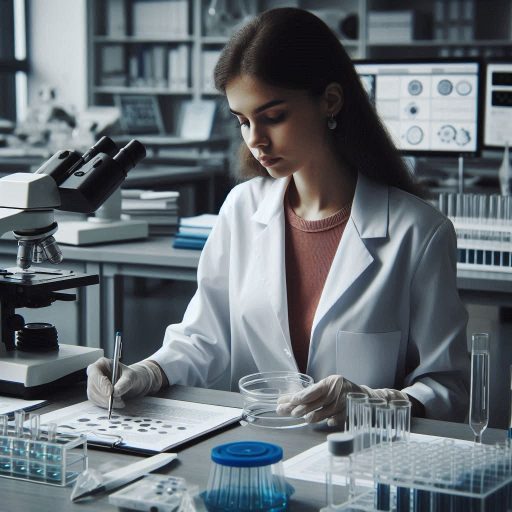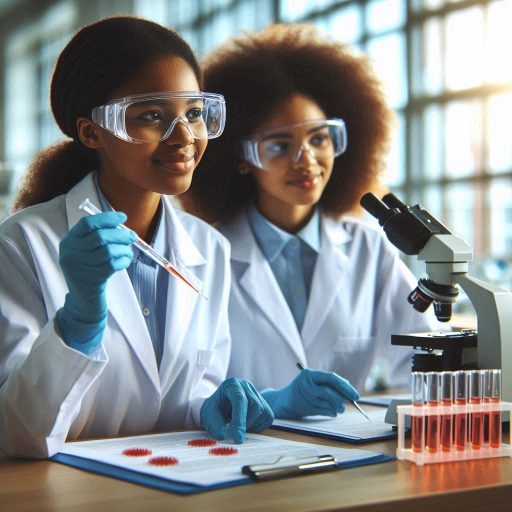Introduction
Microbiology is the study of microorganisms, including bacteria, viruses, fungi, and protozoa.
This field plays a crucial role in various sectors.
Microbiologists work in healthcare, agriculture, environmental science, and food production.
Their research helps us understand disease mechanisms, develop antibiotics, and improve crop yields.
They also contribute to bioremediation efforts and the production of vaccines.
In healthcare, microbiologists identify pathogens and develop diagnostic tools.
They study infectious diseases and find ways to combat antibiotic resistance.
This knowledge is vital for public health and safety.
In agriculture, microbiologists enhance soil fertility and promote sustainable farming practices.
They investigate how beneficial microbes can improve plant health and reduce the need for chemical fertilizers.
The food industry relies on microbiologists to ensure food safety and quality.
They test for harmful bacteria and develop preservation techniques.
Microbiologists also work on fermentation processes, contributing to the production of various food products.
In environmental science, they monitor microbial communities in ecosystems and study their roles in nutrient cycling and pollution degradation.
Despite their significant contributions, modern microbiologists face several challenges.
One major challenge is the rapid emergence of antibiotic-resistant bacteria.
These pathogens pose a significant threat to public health.
Microbiologists must develop new antibiotics and alternative therapies to combat these resistant strains.
Additionally, they must stay updated on the evolving landscape of microbial genetics and resistance mechanisms.
Lack of Funding
Microbiologists today face significant challenges, with a lack of funding being a primary concern.
Securing grants for research projects has become increasingly difficult.
Many researchers struggle to find financial support for innovative studies.
This scarcity of funding limits the scope and scale of microbiological research.
Difficulty in Securing Grants for Research Projects
Without adequate funding, researchers cannot explore critical questions in microbiology.
They often need to abandon promising ideas due to financial constraints.
Limited resources also affect their ability to conduct experiments effectively.
Many microbiologists rely on outdated equipment that hinders their progress.
This situation can lead to a slow pace of discovery in the field.
The competitive nature of grant applications further complicates this issue.
Many scientists compete for a limited pool of funding.
This competition can discourage new researchers from entering the field.
When established researchers dominate funding opportunities, it stifles innovation.
New ideas may go unexplored simply due to a lack of financial backing.
Limited Resources for Conducting Experiments and Buying Necessary Equipment
Moreover, funding shortages impact collaborative efforts in microbiology.
Researchers often rely on partnerships to expand their work.
However, without sufficient funding, these collaborations may falter.
Teams may struggle to secure resources for joint projects.
This limitation can slow down the development of groundbreaking technologies and treatments.
The impact of inadequate funding extends beyond individual projects.
It affects the overall progress and success of microbiological studies.
Researchers may miss critical deadlines due to financial hurdles.
This delay can result in missed opportunities for publishing and sharing findings.
As a result, the entire field suffers from a lack of advancements.
Impact on the Progress and Success of Microbiological Studies
Additionally, the pressure to secure funding can lead to research bias.
Scientists may feel compelled to align their projects with trending topics.
They may prioritize research areas that attract funding rather than those that are scientifically significant.
This shift can divert attention from important microbiological issues.
Funders often focus on short-term results, affecting long-term research goals.
Microbiology requires time and patience for meaningful discoveries.
When funding bodies emphasize immediate outcomes, researchers face additional pressure.
This situation can lead to rushed studies and incomplete data.
To address these challenges, microbiologists must advocate for increased funding.
They should emphasize the importance of microbiological research in public health.
By highlighting the potential benefits, they can encourage more investment in the field.
Moreover, fostering relationships with funding organizations can help.
Building trust and understanding the funding landscape can improve chances of securing grants.
Collaboration with other scientists can also strengthen proposals and attract funding.
In short, a lack of funding presents significant challenges for modern microbiologists.
The difficulties in securing grants hinder research progress and innovation.
Addressing this issue is crucial for the future of microbiological studies and advancements.
Read: Profiles in Success: Leading Chemists of the 21st Century in the US
Rapidly evolving technology
Modern microbiologists face the challenge of rapidly evolving technology.
They must constantly adapt to new tools and methods in their field.
The speed of technological advancement is staggering.
Each year introduces innovative techniques and equipment that enhance research capabilities.
Staying updated requires a continuous commitment to learning and training.
Constant Need to Keep Up with Advancements in Technology
Microbiologists must stay informed about the latest developments.
This includes understanding new research methods and laboratory practices.
Each advancement can lead to significant improvements in research outcomes.
Adapting to these changes is crucial for maintaining productivity and effectiveness.
Training Required to Operate New Equipment and Software
Microbiologists must regularly engage in professional development.
They need to familiarize themselves with the latest laboratory equipment.
This often involves hands-on training to operate new instruments effectively.
Many universities and research institutions offer workshops and courses to assist with this.
However, time constraints can make it difficult to find opportunities for learning.
Additionally, software advancements play a critical role in microbiological research.
New software programs can streamline data analysis and improve accuracy.
Microbiologists must learn to navigate these programs to remain efficient.
Software updates can occur frequently, requiring ongoing education to keep skills current.
Pressure to Stay Relevant in an Ever-Changing Field
The pressure to stay relevant can be overwhelming.
Microbiologists face competition in academia and industry.
Staying updated on technological advancements can influence job prospects and career advancement.
Employers often prefer candidates who demonstrate proficiency in the latest technologies.
This creates a sense of urgency to acquire new skills and knowledge.
Moreover, funding and resource limitations can hinder the ability to access new technology.
Not all laboratories have the budget to invest in cutting-edge equipment.
As a result, some microbiologists may struggle to keep pace with their peers.
This can lead to feelings of inadequacy or frustration.
Collaboration can help mitigate some challenges associated with evolving technology.
By partnering with other researchers, microbiologists can share resources and expertise.
Collaborative efforts can also foster an environment of collective learning.
Such partnerships can enhance knowledge and lead to innovative solutions.
To thrive in this dynamic environment, microbiologists must develop a growth mindset.
Embracing lifelong learning will allow them to adapt and excel.
Engaging in professional organizations can also provide valuable networking opportunities.
These organizations often offer access to resources and training.
All in all, rapidly evolving technology presents significant challenges for modern microbiologists.
The constant need to stay current requires ongoing training and adaptability.
While the pressure can be daunting, embracing change can lead to new opportunities.
By remaining proactive and resourceful, microbiologists can navigate this ever-changing landscape successfully.
Antibiotic resistance
Antibiotic resistance presents a rising threat to public health worldwide.
Modern microbiologists face significant challenges in combating resistant bacteria.
These bacteria evolve rapidly, often rendering standard treatments ineffective.
The overuse and misuse of antibiotics in healthcare and agriculture accelerate this process.
Infections caused by resistant strains can lead to increased morbidity and mortality.
Rising Threat of Antibiotic-Resistant Bacteria
The World Health Organization warns about the growing prevalence of antibiotic resistance.
Infections that were once easily treatable now pose serious risks.
Common procedures like surgeries and chemotherapy become dangerous without effective antibiotics.
Healthcare costs rise sharply due to longer hospital stays and more complex treatments.
Efforts to Develop New Antibiotics and Treatments
Microbiologists strive to develop new antibiotics to address this crisis.
They explore alternative treatments, such as bacteriophages and antimicrobial peptides.
These approaches offer promising solutions against resistant bacteria.
However, developing new antibiotics is a lengthy and costly process.
Many pharmaceutical companies are hesitant to invest in antibiotic research due to limited financial incentives.
In addition, stringent regulatory requirements complicate the development of new antibiotics.
Clinical trials for new drugs can take years, delaying access to treatments.
Even after successful trials, resistance can develop quickly, rendering new antibiotics ineffective.
This cyclical nature of resistance makes it difficult for microbiologists to keep pace with evolving bacteria.
Struggles in Combating Resistant Strains and Preventing Infections
Struggles also arise in preventing infections caused by resistant strains.
Healthcare facilities must adopt strict infection control measures to mitigate risks.
Proper sanitation and hygiene practices are essential in hospitals and clinics.
Education and training of healthcare staff on antibiotic stewardship are crucial.
However, compliance with these measures can be inconsistent.
Public awareness about antibiotic resistance remains limited.
Many people still expect antibiotics for viral infections, which do not respond to these medications.
Educational campaigns are necessary to inform the public about responsible antibiotic use.
Patients must understand the importance of following prescribed treatments and avoiding misuse.
Global collaboration is vital in addressing antibiotic resistance.
Researchers, healthcare providers, and policymakers must work together to find solutions.
Surveillance systems can help track resistance patterns and inform treatment guidelines.
Sharing data and resources across borders enhances the fight against resistant bacteria.
When all is said and done, antibiotic resistance poses a significant challenge for modern microbiologists.
The rising threat of resistant bacteria necessitates urgent action and innovation.
While efforts to develop new treatments continue, struggles in combating these strains persist.
Only through collaboration, education, and responsible use of antibiotics can we hope to overcome this critical public health issue.
Read: The Life and Times of a U.S. Physicist: A Day in Detail
Biosecurity Concerns
Modern microbiologists face significant biosecurity concerns that impact their research and public health efforts.
One of the primary risks involves the accidental release of harmful pathogens.
Such incidents can occur due to human error, equipment failure, or inadequate containment measures.
When a pathogen escapes, it can pose severe threats to human health, agriculture, and ecosystems.
Risks of Accidental Release of Harmful Pathogens
The accidental release of harmful pathogens presents a serious risk in microbiology.
These incidents can happen in various ways, such as laboratory accidents or breaches in containment.
A pathogen escaping into the environment can lead to widespread outbreaks, affecting communities and wildlife.
Ensuring that all laboratory practices minimize these risks is essential for protecting public health.
Importance of Following Strict Safety Protocols in Labs
To mitigate these risks, laboratories must adhere to strict safety protocols.
These protocols ensure that harmful microorganisms are handled safely and securely.
Laboratories typically implement a range of biosafety levels (BSL) that dictate how pathogens are managed.
Each BSL level has specific requirements regarding laboratory design, safety equipment, and personnel training.
For instance, BSL-1 labs manage non-pathogenic microorganisms, while BSL-4 labs handle the most dangerous pathogens, like Ebola.
Researchers must use proper personal protective equipment (PPE) and follow decontamination procedures.
Regular training on biosecurity protocols is essential to maintain a culture of safety in the lab.
Moreover, facilities must undergo routine inspections to ensure compliance with biosecurity measures.
These inspections identify vulnerabilities and ensure that labs are equipped to handle biohazards.
Failure to comply with biosecurity protocols can lead to catastrophic consequences.
A breach may result in outbreaks, economic losses, and loss of public trust in scientific research.
Potential Consequences of Breaches in Biosecurity Measures
In recent years, the COVID-19 pandemic highlighted the importance of biosecurity in microbiology.
Accidental or deliberate release of pathogens can result in global health crises.
The pandemic underscored the need for stricter biosecurity measures in laboratories handling dangerous pathogens.
It also prompted discussions on how to balance scientific advancement with public safety concerns.
Research institutions must collaborate with regulatory agencies to enhance biosecurity standards.
Establishing clear communication channels between researchers and policymakers is vital.
This collaboration can help to develop effective strategies for managing biosecurity risks.
Furthermore, public awareness of biosecurity issues is crucial.
Engaging the public in discussions about biosecurity can foster understanding and support for safety measures.
Public trust in microbiological research depends on transparency and responsible practices.
To sum it up, biosecurity concerns remain a significant challenge for modern microbiologists.
The risks of accidental release of harmful pathogens necessitate strict adherence to safety protocols.
Institutions must continuously evaluate their biosecurity measures to protect public health.
By prioritizing safety and fostering a culture of responsibility, microbiologists can contribute to a safer scientific environment.
The ongoing dialogue about biosecurity will ensure that microbiologists navigate these challenges effectively while advancing their vital work.
Read: Salary Ranges: What to Expect as a Physicist in the USA
Transform Your Career Today
Unlock a personalized career strategy that drives real results. Get tailored advice and a roadmap designed just for you.
Start Now
Data management and analysis
Modern microbiologists face significant challenges in data management and analysis.
The volume of data generated from experiments can be overwhelming.
High-throughput sequencing technologies produce vast amounts of genetic data.
This data often requires sophisticated tools for storage and management.
Handling Large Amounts of Data Generated from Experiments
Microbiologists must effectively handle this data to draw meaningful conclusions.
They need to ensure that all data is accurately recorded.
A single error can lead to incorrect interpretations and wasted resources.
Furthermore, data integrity is crucial for reproducibility in scientific research.
Analyzing and Interpreting Complex Data Sets
Analyzing complex data sets presents additional challenges.
Researchers must employ advanced statistical techniques to interpret results correctly.
Many microbiologists may not have extensive training in statistics.
This gap can lead to misinterpretation of significant findings.
Visualization tools can assist in understanding large data sets.
However, choosing the right tool can be challenging.
Microbiologists must select from a variety of software options available.
Each tool has different strengths and weaknesses, making the selection process daunting.
Challenges in Maintaining Accuracy and Relevance of Findings
Maintaining accuracy in data analysis is vital.
Inaccurate data analysis can compromise the validity of research findings.
This challenge emphasizes the need for robust quality control measures.
Regular audits of data collection and analysis processes can help identify issues early.
Microbiologists often work in interdisciplinary teams.
Collaborating with data scientists can enhance data analysis capabilities.
This partnership allows microbiologists to focus on their core expertise.
It also helps integrate advanced data analysis methods into their research.
Another significant challenge involves keeping data relevant.
Rapid advancements in microbiology can render some data obsolete quickly.
Researchers must continually assess the relevance of their findings.
They need to update their databases and analyses regularly to reflect current knowledge.
Data management also involves ethical considerations.
Microbiologists must ensure that they comply with regulations regarding data privacy.
This requirement can complicate data sharing and collaboration efforts.
Balancing openness with ethical obligations remains a critical issue.
Finally, funding limitations can impact data management and analysis efforts.
Microbiology research often depends on grants that may not cover data management expenses.
This limitation can restrict access to essential tools and technologies.
In essence, data management and analysis pose significant challenges for modern microbiologists.
Handling large data volumes, analyzing complex sets, and maintaining accuracy are crucial issues.
Collaborating with data scientists and ensuring ethical compliance can enhance their capabilities.
By addressing these challenges, microbiologists can advance their research and contribute significantly to the field.
Read: Physics Specializations: Choosing Your Path in the U.S.
Ethical dilemmas
Modern microbiologists face significant ethical dilemmas that impact their research and scientific progress.
As they push boundaries, they must balance scientific discovery with ethical considerations.
This balance often proves challenging, especially in fields like genetic engineering and manipulation.
Scientists must weigh the benefits of their discoveries against potential risks and societal concerns.
Balancing Scientific Discovery with Ethical Considerations
Microbiologists must navigate the complex landscape of ethical dilemmas in their research.
As they explore innovative technologies, the potential for groundbreaking discoveries can clash with ethical concerns.
Researchers are tasked with determining whether their work aligns with moral standards and societal expectations.
Finding this balance is critical for fostering public trust in science.
Controversies Surrounding Genetic Engineering and Manipulation
Genetic engineering remains a controversial topic.
Many microbiologists explore gene editing technologies like CRISPR to advance their research.
While these innovations offer significant potential, they also raise ethical questions.
Concerns about unintended consequences loom large.
Potential impacts on ecosystems, human health, and biodiversity create a complex landscape for researchers.
Debates over genetic manipulation often center around the implications for future generations.
The idea of altering genes to enhance traits or prevent diseases can be enticing.
However, ethical concerns arise regarding “designer organisms” and the extent of human intervention in natural processes.
This makes it vital for microbiologists to engage in ongoing discussions about the implications of their work.
Accountability of Microbiologists in Their Research Practices
Accountability also plays a crucial role in the ethical landscape of microbiology.
Scientists must adhere to strict research practices and ethical guidelines.
Failing to do so can lead to significant consequences, not just for the individual but for the entire field.
Misconduct in research, such as data falsification or unethical experimentation, undermines public trust in science.
Therefore, microbiologists must be vigilant in maintaining integrity throughout their research.
Additionally, microbiologists need to consider the social implications of their work.
Research findings can influence public policies and health practices.
Ethical dilemmas arise when the consequences of their research affect vulnerable populations.
Therefore, scientists must engage with the public and policymakers to address these concerns.
Another aspect of accountability involves the role of funding agencies and corporations.
Researchers often rely on external funding for their projects.
This dependence can create conflicts of interest, especially if funding sources have specific agendas.
Microbiologists must navigate these relationships carefully to maintain their independence and objectivity.
To address these ethical dilemmas, many microbiologists advocate for robust ethical training.
Education programs can help future scientists understand the complexities of their work.
This training should emphasize the importance of ethical considerations in scientific research.
In fact, ethical dilemmas pose significant challenges for modern microbiologists.
Balancing scientific discovery with ethical considerations requires ongoing reflection and dialogue.
As the field evolves, microbiologists must remain accountable for their research practices.
Only then can they navigate the complexities of their work and contribute positively to society.
Collaboration and Communication
Modern microbiologists face significant challenges in collaboration and communication.
The need for interdisciplinary collaboration has become crucial in microbiology.
Microbiological research often intersects with fields like genomics, bioinformatics, and environmental science.
Successful collaboration fosters innovative approaches to complex problems.
Need for Interdisciplinary Collaboration in Microbiology
The need for interdisciplinary collaboration has become crucial in microbiology.
Microbiological research often intersects with fields like genomics, bioinformatics, and environmental science.
Successful collaboration fosters innovative approaches to complex problems.
However, working with experts from different fields poses unique challenges.
Challenges in Working with Experts from Different Fields
First, varying terminologies can create misunderstandings.
Each discipline has its own jargon and methods, making it hard to communicate effectively.
Researchers may misinterpret data or concepts due to these differences.
Additionally, diverse research priorities can complicate collaboration.
For example, microbiologists might focus on disease control, while geneticists may prioritize gene editing techniques.
Aligning these different goals requires open dialogue and compromise.
Another challenge arises from varying methodologies.
Each discipline employs distinct techniques and tools.
For instance, microbiologists often use cultures, while bioinformaticians rely on computational models.
Integrating these approaches can be difficult.
Researchers must navigate different protocols, which can lead to confusion and inefficiency.
Moreover, collaborating across disciplines requires time and effort.
Scientists often face tight deadlines and funding constraints.
They may struggle to allocate time for collaboration amidst their individual responsibilities.
Balancing collaboration with personal research goals can be overwhelming.
Importance of Effective Communication in Sharing Findings and Knowledge
Effective communication is vital for overcoming these challenges.
Clear communication helps bridge gaps between disciplines.
Researchers should prioritize sharing findings and knowledge openly.
Regular meetings can facilitate dialogue and ensure everyone is on the same page.
Collaborative platforms, like online forums or project management tools, can streamline communication.
Additionally, researchers should practice active listening.
Understanding different perspectives enhances collaboration.
It fosters a culture of respect and teamwork.
Effective communication also involves presenting complex data clearly.
Researchers should tailor their findings to suit their audience.
Building strong relationships with colleagues can also improve collaboration.
Networking within and outside the scientific community can open doors.
Attending conferences and workshops allows researchers to connect with experts from various fields.
Establishing rapport makes future collaborations smoother.
Moreover, interdisciplinary training can enhance communication skills.
Educational programs should emphasize teamwork and collaboration.
Researchers should learn how to communicate their work to diverse audiences.
This will foster a culture of collaboration and innovation in microbiology.
In a nutshell, the challenges of collaboration and communication in microbiology are significant.
Yet, they are not insurmountable.
By prioritizing effective communication and fostering interdisciplinary relationships, microbiologists can overcome these obstacles.
Emphasizing collaboration will lead to breakthroughs that benefit science and society as a whole.
Discover More: Challenges Faced by Modern Materials Scientists
Find Out More: Ethics and Challenges in Climatology Research
Conclusion
Modern microbiologists encounter numerous challenges in their field.
They deal with antibiotic resistance, which complicates treatment options.
Emerging pathogens pose new threats to public health.
Moreover, microbiologists face difficulties in securing funding for innovative research.
The rapid advancement of technology requires continuous adaptation and learning.
Environmental changes also impact microbial ecosystems, adding to their workload.
In addition, regulatory challenges can hinder the development of new treatments.
Microbiologists must navigate complex ethical issues in genetic research and biotechnologies.
Despite these obstacles, microbiologists remain resilient and dedicated to their work.
Their commitment to understanding microorganisms is vital for society’s health.
They tirelessly pursue solutions to combat infectious diseases.
These professionals work on developing new vaccines and therapies.
Their research contributes to advancements in agriculture, food safety, and environmental sustainability.
Microbiologists also play a crucial role in addressing global health issues, such as pandemics.
Their expertise is essential for public health and safety.
It is important to recognize and support microbiologists in their efforts.
They deserve acknowledgment for their contributions to science and society.
Encouraging investment in microbiological research can lead to groundbreaking discoveries.
Promoting education and training in microbiology is vital for future generations.
Supporting initiatives that enhance research funding will empower scientists to tackle pressing challenges.
Advocacy for microbiologists can lead to better policies and resources.
[E-Books for Sale]
The Big Book of 500 High-Paying Jobs in America: Unlock Your Earning Potential
$19.99 • 500 High-Paying Jobs • 330 pages
Explore 500 high-paying jobs in America and learn how to boost your career, earn more, and achieve success!
See All 500 High-Paying Jobs of this E-Book
1001 Professions Without a Degree: High-Paying American Jobs You Can Start Now
$19.99 • 1001 Professions Without a Degree • 174 pages
Discover 1001 high-paying jobs without a degree! Unlock career tips, skills, and success strategies for just $19.99!




